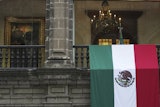The National Association of Manufacturers (NAM) yesterday expressed appreciation for the fact that the G-7 Finance Ministers and Central Bank Governors agreed that China needs to allow faster appreciation of its currency and lessen reliance on export-led growth strategies.
“The NAM has been pressing for several years for a more market-oriented exchange rate for China’s currency as a means of lessening trade distortions,” NAM President John Engler said in a prepared statement, “and it is extremely important that the call for upward appreciation of the yuan has now been multilateralized with unanimous agreement by the world’s major economies.
“A multilateral approach is always better than a unilateral one,” Engler continued, “and the G-7 statement marks a watershed in this process – showing that the United States is no longer alone in pointing to the needed adjustments.”
“America’s manufacturers are also very pleased that the International Monetary Fund (IMF) is shifting gears and will become much more aggressive in working both multilaterally and bilaterally to deal with the forces that are causing trade imbalances,” said Engler. “The world needs an effective IMF if we are to deal with imbalances before they become so huge they become unstoppable runaways, and we urge the IMF to move quickly."
The statement by NAm follows meeting between the the Bush administration and Chinese President Hu Jintao. The Associated Press reported that U.S. officials said the meeting of the U.S.-China financial market working group did not address currency flexibility specifically but explored all of the reforms that China will need to introduce to allow the value of the yuan to float freely with its value set by market forces.
In the AP report, American manufacturers contended that the Chinese currency is undervalued by as much as 40 percent, making Chinese goods cheaper in the U.S. and American products more expensive in China. They say it is playing a significant role in America's record $202 billion trade deficit with China.In his remak's NAM's Engler credited Treasury Secretary John Snow and Under Secretary Tim Adams for "ceaseless work to bring about this weekend’s developments.”



















